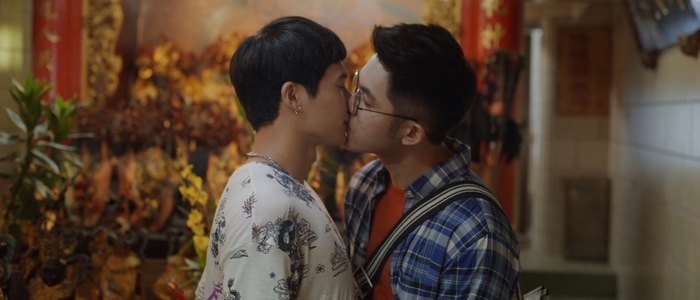
Komorebi Movie Summary
Title:
日光樹影
Movie Info:
Taiwan (2021)
Genre:
Drama
About:
Komorebi is a nice & heartwarming short film.
Is Komorebi BL?
Yes, Komorebi has a gay romance.
Plot
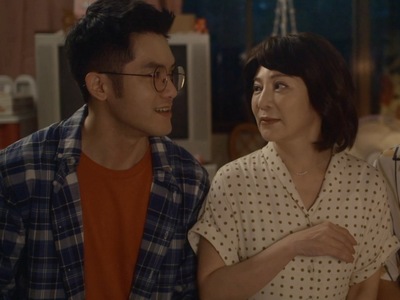
Jhe-Ming and Jheng are childhood friends who recently got married. They have been in a committed relationship for the past seven years. The two of them are happily in love. After tying the knot, they plan to hold a small wedding ceremony with a collection of their loved ones. However, Jhe-Ming and Jheng aren't out to everyone in their families.
Jheng works with his dad at a temple in a very traditional line of work. He doesn't even entertain the idea of coming out to his father. However, Jheng's mom had passed away before he could tell her about his relationship. One of Jheng's lifelong regrets is that he kept this secret from his mother. He envies his partner Jhe-Ming, who could still have a close relationship with his mom.
Jhe-Ming has two sisters. Ruo-Jhen is divorced, childless, and lives with her mom. Ruo-Chun is married and struggling to conceive a child with her husband. Both sisters know about their brother's relationship with Jheng. However, their mom Jiao is blissfully unaware of her son's sexuality. As far as she's concerned, Jhe-Ming's last serious relationship is with his college girlfriend from years ago. She suspects her son might be dating someone right now, but he won't tell her the information.
Since it's his mom's birthday, Jhe-Ming visits the family home to celebrate the special occasion. Ruo-Chun's husband steers the conversation to an LGBT topic during dinner, unaware of his brother-in-law's sexuality. The chat grows awkward as the three siblings exchange glances, mull over silences, and try changing the subject. Jhe-Ming's mom doesn't seem suspicious, however.
Later, Jhe-Ming gives his mom a present from Jheng. Once again, his nosy brother-in-law inquires about Jheng, curious whether this is Jhe-Ming's girlfriend. The conversation shifts to Jhe-Ming's mysterious love life. Jiao talks about her son's ex-girlfriend from college and wonders why that relationship didn't last. Jhe-Ming continues evading the obvious, unwilling to tell his mom the truth.
Komorebi Movie Trailer
Komorebi Movie Cast
Characters
Jhe-Ming
Adam Lin (林冠宇)

Jhe-Ming is a YouTuber who makes videos for a living. He has been in a committed relationship with his childhood friend, Jheng. They recently got married. Jhe-Ming's two sisters know about this relationship. However, his mom remains blissfully unaware and believes her son is still waiting for the right woman.
Adam Lin

Adam Lin (林冠宇) is a Taiwanese actor. He is born in 1991. His BL projects include the Jump the Boy series (2020) and the Komorebi short movie (2021).
Jiao
Lotus Wang (王彩樺)
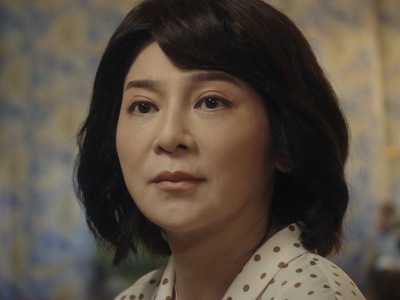
Jiao is Jhe-Ming's mother, currently in her fifties. She is divorced from her unfaithful husband. Jiao has three children, two daughters and a son. She lives with Ruo-Jhen, her divorced and childless daughter. Jiao is curious about Jhe-Ming's love life and speculates whether he has a relationship or not.
Lotus Wang

Lotus Wang (王彩樺) is a Taiwanese actress. She is born on November 24, 1969. She has appeared in various BL projects, including Your Name Engraved Herein (2020), Komorebi (2021), and Be Loved in House (2021).
Jheng
Guan Zhi Huang (黃冠智)

Jheng is Jhe-Ming's husband. They are childhood friends who have been in a committed relationship for the past seven years. The two of them recently got married. Jheng works with his father at a temple. Jheng's mother passed away before he could come out to her.
Guan Zhi Huang

Guan Zhi Huang (黃冠智) is a Taiwanese actor. He is born on September 15, 1995. His BL projects include the Jump the Boy series (2020) and the Komorebi short movie (2021). He is the lead of the 2024 gay movie Silent Sparks.
Supporting Cast

Ruo-Jhen
Nina Chang (張寗)

Ruo-Chun
Belle Shin (辛樂兒)

Chung-Ming
Roy Wu (吳秉宸)
Cast Highlights
Jump the Boy
Both leads appeared in multiple seasons of the 2020 Taiwanese BL webseries Jump the Boy. They also starred in the 2020 gay short film Little Man.
Guan Zhi Huang
Jheng's actor is one of the leads in the 2024 gay movie, Silent Sparks.
Lotus Wang
The actress who portrays Jhe-Ming's mom portrayed the mom in Your Name Engraved Herein (2020). She was also the lead character's mom in Be Loved in House (2021).
Ray Wu
Chung-Ming's actor (Roy Wu) is the lead of the 2024 sci-fi drama Anti Reset.
Komorebi Movie Review
Review
Movie Review Score: 7.5

Komorebi is a realistic and relatable coming-out story with a gentle touch. Telling your traditional parents that you're gay can be a nerve-wracking experience, full of tension, uncertainty, and self-doubt. This movie aims to reassure the viewers with a continuous flow of encouragement. Any anxiety in the narrative is accompanied by positivity and compassion. Komorebi is a sensitive film that empathizes deeply with its gay protagonist.
The story's down-to-earth vibe is one of its strengths. Komorebi is a remarkably low-key movie, showcasing ordinary characters, authentic interactions, and mundane events. You can easily relate to Jhe-Ming's fictional family, which feels like a genuine portrayal of the everyday Taiwanese lifestyle. The modest narrative also keeps any melodrama or angst to a minimum. Most of the emotional tension is quiet, understated, and introspective.
How much you enjoy Komorebi depends on how engaged you are by Jhe-Ming's relationship with his mom & sisters. The movie does a decent job of illustrating their nuanced character dynamics. In under thirty minutes, the well-paced plot establishes everyone's personalities, backstories, and motivations cohesively. Many scenes between them are heartfelt, striking the best balance of realism and sincerity. Personally, I'm a sucker for sentimental BL stories that explore family bonds, so the movie is right up my alley.
Komorebi focuses on the coming-out journey, so the relationship between Jhe-Ming and Jheng takes a backseat. We see glimpses of the newlywed couple interacting, enough to conclude that they maintain a healthy and affectionate marriage. While the content feels adequate, it's perhaps not entirely satisfying to the seasoned BL watcher. The short thirty-minute film sacrifices depth in some areas, where the romance takes the biggest hit. Jhe-Ming and Jheng's connection feels peripheral rather than serving as the emotional core of the drama.
Still, the most crucial dynamic is between the protagonist and his mom, a storyline that Komorebi handles exquisitely. Their scenes together are intimate and delicate, anchored by steady performances from the two leads. The actress Lotus Wang has portrayed the matriarch character in so many BL projects that she's the personification of parental warmth. Although the mother-son relationship builds up enjoyably, the movie's climax doesn't wow me. Jhe-Ming's coming-out scene is soft and subdued, not resonating as powerfully as I hoped.
Komorebi finishes with a poetic metaphor that thoughtfully reflects on the movie's themes. I must admit the conclusion only generates a faint emotional response instead of stirring my heart. Nonetheless, the mild-mannered ending doesn't diminish my positive impression of the film. I remain fond of the endearing characters, pleasant vibes, and tender messages. Limited by its short length and simplicity, Komorebi might not be a breakthrough for the genre. Nonetheless, it's a thoroughly solid coming-out story with respectable merits.
Summary
Gentle story
Komorebi is a gentle and thoughtful movie that depicts a gay man's coming-out journey. The down-to-earth story features realistic and relatable characters.
Light romance
The romantic content takes a backseat compared to the coming-out drama. Jhe-Ming and Jheng have a healthy marriage, but their relationship is a peripheral focus.
Steady acting
Komorebi is backed by steady acting performances from the leads. The actress Lotus Wang has so much experience playing the mom character to a closeted son in many BL movies & dramas.
Subdued ending
Komorebi has a satisfactory ending, using soft and subdued symbolism to convey the movie's themes. However, the mild-mannered conclusion didn't resonate with me that powerfully.
Decent artistry
The film has solid production values with vivid visuals and clean scene composition. The soundtrack is lovely as well.
75%
Komorebi is a solid coming-out movie with nuanced character dynamics. Although slightly limited by its short length and simplicity, the story is thoughtful and meaningful.
Komorebi Movie Ending Explained
Ending
Ending explained
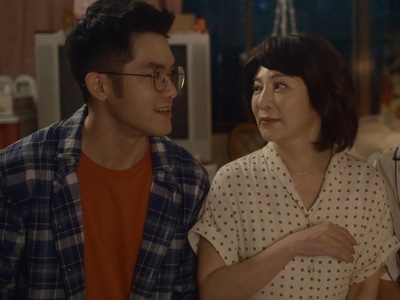
I describe Komorebi as a coming-out film, but the irony is that Jhe-Ming never feels comfortable enough to come out in the end. He inches his way out of the closet by testing the waters. However, the mom's reception doesn't seem positive, so he goes back into hiding again. Jhe-Ming doesn't conclude the movie waving the pride flag and attending PFLAG marches with his mother. Despite the story's relentless positivity, his character is still afraid to reveal his sexuality in the ending.
Unfortunately, Jhe-Ming's situation is prevalent in society. He's an avatar for many gay men and women who cannot be out to their families. Look at the facts without the context of his sexuality. He's an adult man in a committed relationship to his partner of seven years. Yet, he still doesn't feel comfortable enough to disclose his marriage to his mother. There's a problem here, but the blame doesn't fall solely with Jhe-Ming. The fault also lies with his mother, her heteronormative views, and the close-mindedness of society.
I would love for the movie to end with Jhe-Ming honest about his relationship with Jheng. However, it's also understandable why he backtracked in the last second after sensing apprehension from his mom. Some may call it cowardice, but many will relate to his practicality. Komorebi is a candid film about how not every LGBT protagonist can come out. Instead, they maintain the status quo and wait for another opportunity in the future. It's not satisfying from a narrative point of view, but Jhe-Ming's experiences are shared by many viewers, I'm sure.
Komorebi meaning

In the final scene, Jhe-Ming's mom explains the meaning behind the movie's title. Komorebi (木漏れ日) is a Japanese term used to describe the gentle warmth of sunshine as it filters through the trees. Imagine if it's a bright sunny day outside, but you stand under a tree where only a partial beam of sunlight appears visible. You're in a delicate position between light and shadow, where you can see some of the sun, but not the full picture. The komorebi term states this feeling is very cozy and comfortable.
Komorebi describes Jhe-Ming's situation with his mom at the end of the film. He gives a tiny hint about his relationship with Jheng, hypothetical enough to leave room for interpretation. His mom has a vague idea of what he means, but she never gets complete confirmation. Both characters are content with this partial version of the truth, as the movie suggests it's the best arrangement for them right now. They're exposed to some of the sunlight without directly confronting all the visibility at once.
Not every coming-out process can be as quick and straightforward as, "Hey mom, I'm gay!" It might be more of a gradual journey for some people, easing your parents into the idea slowly and surely. Maybe one day, both Jhe-Ming and his mom will feel comfortable enough to step out of the shadows, basking in the full warmth of the sunlight together.
Ending symbolism
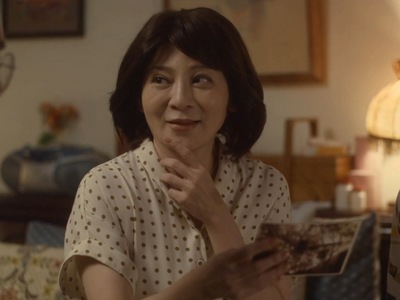
The movie uses a metaphor to demonstrate the concept of komorebi. The final scene involves Jhe-Ming, his mom, and Jheng taking a selfie together with an old candid camera. Jheng suggests that he'll get the photos developed right away. However, the mom tells him to hold off until they finish using the film. It's an old camera anyway, and she doesn't mind waiting to see the pictures later. There's no rush.
This quick moment is symbolic of Jiao's mindset towards her son's sexuality. Basically, she isn't ready right now. She doesn't want to see the truth about her son's gay relationship yet. So, let the picture sit inside the camera a little longer. Allow her to enjoy the gentle comfort of komorebi, where she can maintain a peaceful relationship and avoid drama with her son.
Happy ending
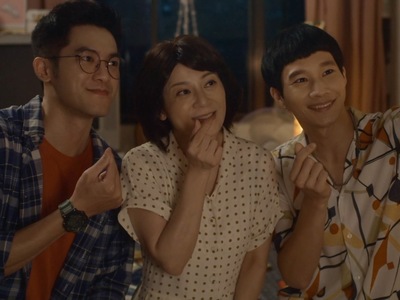
Komorebi doesn't have a traditional happy ending since Jhe-Ming never comes out to his mother. The movie finishes with him in the closet, still hiding the marriage. However, the film contains an uplifting message that implies all the characters are happy, even without telling the truth. The final scene shows Jhe-Ming chatting lightheartedly with his mother & husband. Jiao might not know about their relationship, but she's comfortable spending time with Jheng. Had he come out, maybe they wouldn't enjoy this blissful moment together.
It's possible the mom already knows about her son's relationship. Jiao has shown she's quite observant, picking up subtle cues like her son's wedding ring. Maybe she pretends to play dumb, not wanting to voice her disapproval and hurt the relationship with her child. Or perhaps she honestly doesn't know about them, remaining in blissful ignorance. Either way, Jiao is content right now and doesn't wish to disturb the status quo.
The final exchange in the film confirms Jiao's mindset. "Don't you want to see if you like it or not?" Jhe-Ming asks his mom about developing the pictures in the camera. "I'm happy if you're happy," she replies with a smile. The statement implies that she doesn't need to know all the details of his relationship. Jhe-Ming can stop worrying about when to come out to his mother. There's no urgency or pressure from her. The timing can be now, or preferably later, or possibly never. As long as he has a fulfilling life, that's enough to satisfy his mom.
Komorebi Movie Information
Links
- Gagaoolala Komorebi Gagaoolala
- MyDramaList Komorebi MyDramaList
- Website Komorebi website
- YouTube Komorebi YouTube
Portico Media

Portico Production is a Taiwanese BL studio that produced various LGBT movies, such as The Teacher (2019) and Komorebi (2021). It is the subsidiary of Portico Media, a Taiwanese entertainment platform with licensing rights to various shows around the world.
Director
The director Ting-Chun Huang was in charge of the 2014 Taiwanese gay film That Room, the 2016 film Sodom's Cat, and the 2020 short movie Little Man.